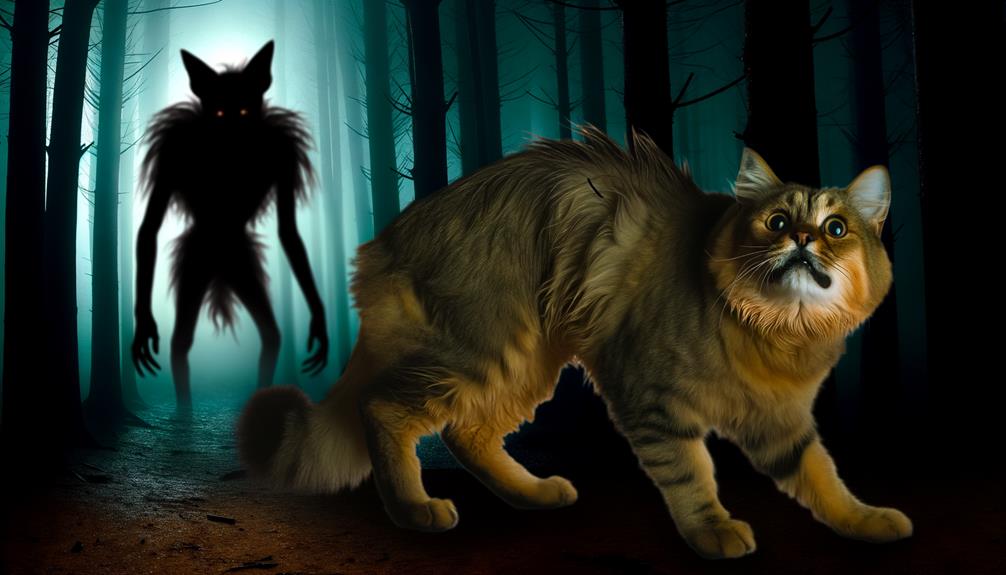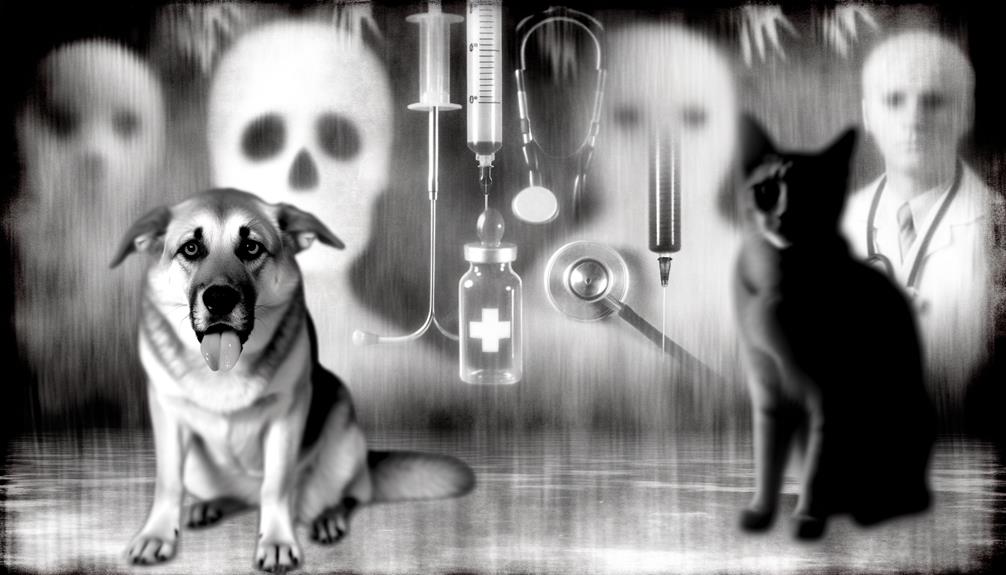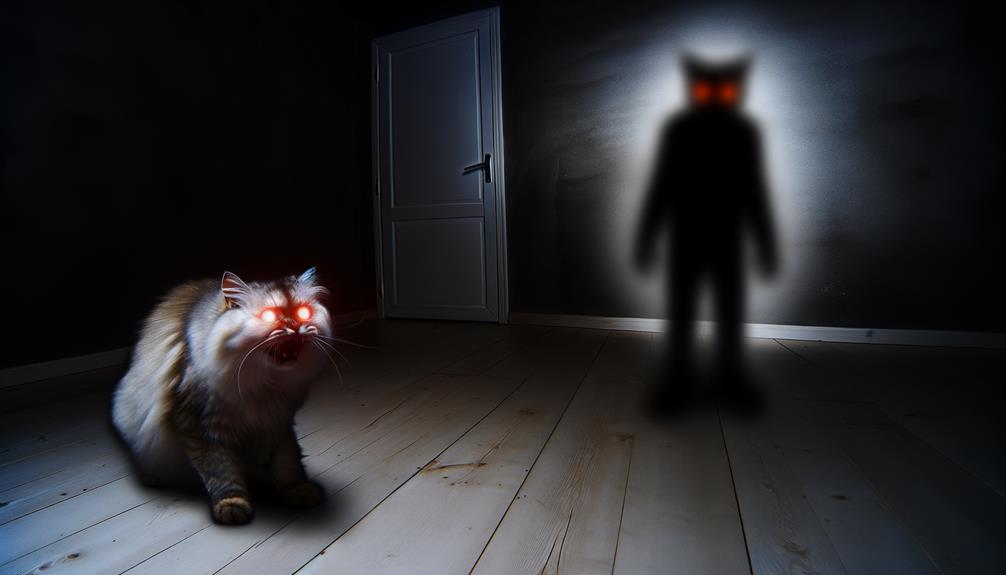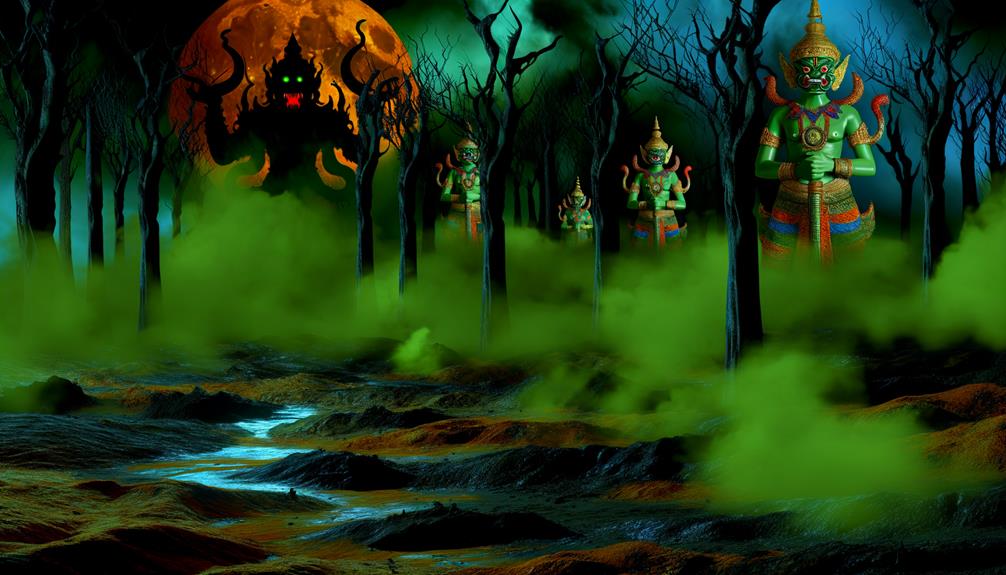Your pets can sense things you can't see, especially if evil spirits are around. Many pet owners report their cats hissing or dogs barking at empty spaces. These behaviors might mean they're detecting supernatural presences. Pets often show signs like agitation or reluctance to enter certain areas. They're highly sensitive to changes in their environment, which could be linked to their emotional bond with you. Historical and cultural beliefs also hint at this special sensitivity animals possess. To explore how pets' behaviors can indicate the presence of spirits and what to watch out for, you'll want to keep going.
Pets and Supernatural Perceptions
Many pet owners believe their furry friends possess a unique ability to perceive supernatural entities. This belief isn't unfounded; 30% of UK pet owners think their pets can protect them against ghosts and evil spirits.
If your dog starts barking, growling, or staring at empty spaces, it might be sensing an unseen presence around. Good news for you, as these behaviors suggest your pet is acting as a protective barrier against potential supernatural threats.
In the last month alone, 25% of dog owners reported their pets displaying such signs. Similarly, 25% of cat owners have observed their cats hissing or growling at invisible entities within the past four weeks.
These reactions reinforce the idea that animals are attuned to forces beyond our immediate perception. If you've noticed your pet acting unusually in areas where death has occurred, it might be sensing lingering spiritual phenomena.
A survey by Blue Cross, involving over 2,000 UK pet owners, shows a significant belief in the protective qualities of pets regarding supernatural threats.
Psychic Abilities of Pets
When you notice your pet behaving oddly, it mightn't just be sensing supernatural entities; it could also be tapping into its psychic abilities. Many pet owners believe their furry companions can predict illness. Dogs, for example, can detect kidney infections and even prostate cancer in urine samples with up to 98% accuracy. This incredible skill is just one way pets showcase their psychic abilities.
Pets often know when their owners are about to arrive home or sense if they're about to leave. This heightened awareness isn't limited to cats and dogs. Rabbits and horses also exhibit behaviors that suggest psychic awareness, enriching our understanding of animal sensitivity.
Consider these fascinating behaviors:
- Predicting Illness: Your pet might sense when you're unwell before you even show symptoms.
- Emotional Awareness: Pets often respond to your emotional states, providing comfort when you're sad or stressed.
- Routine Changes: They can detect shifts in daily routines, such as knowing when family members are arriving or departing.
- Supernatural Sensing: Some pets appear to sense supernatural entities or emotional distress in their environment.
These examples highlight the unique abilities that make pets so attuned to their surroundings and their owners' well-being. All rights reserved.
Bonding and Sensory Awareness

You might notice that your pet has an uncanny ability to sense environmental changes and your emotional state.
This heightened awareness often allows them to predict health issues, making them excellent companions in times of need.
Their unusual behaviors, like barking at empty spaces, suggest they might be detecting unseen forces, further showcasing their unique sensory skills.
Detecting Environmental Changes
Pets often amaze us with their uncanny ability to detect subtle environmental changes, a skill rooted in their strong bonds with their owners and their heightened sensory awareness. This connection allows pets to pick up on shifts in their surroundings that might go unnoticed by humans.
Dogs, for example, have an extraordinary sense of smell and hearing, enabling them to sense impending storms or natural disasters well before they happen. This heightened awareness often extends to detecting negative energies or disturbances in their environment, which can include the presence of evil spirits.
When you notice your pet acting out of the ordinary, it might be their way of signaling environmental changes. Dogs and cats, in particular, are known to exhibit psychic-like behaviors, responding to unseen forces or entities. A survey showed that 75% of pet owners believe their pets can predict illness, highlighting their acute sensitivity to changes in their owners' well-being and the environment.
Here are some signs to look out for:
- Unusual calmness or agitation in your pet
- Barking or hissing at seemingly empty spaces
- Reluctance to enter certain areas of your home
- Unexplained changes in eating or sleeping habits
These behaviors might be your pet's way of communicating the presence of negative energy or environmental shifts.
Sensing Owner's Emotions
Over the years, countless pet owners have marveled at their animals' uncanny ability to sense their emotions. Pets often exhibit heightened sensitivity to your emotional state, detecting even subtle changes in your mood or distress. This isn't just anecdotal; studies indicate that dogs and cats frequently display behaviors suggesting they pick up on their owner's feelings, almost as if they've a psychic connection.
The strong bond you share with your pet can enhance this sensitivity. When you're feeling down or stressed, your pet might respond protectively, offering comfort and emotional support. For example, many owners report their pets snuggling closer or behaving more attentively during tough times. This responsiveness isn't merely coincidental but a demonstration of the deep, intuitive connection between you and your animal.
Pets also seem to react to environmental shifts, like storms, which often mirror your own stress levels. This dual awareness strengthens the bond between you and your pet, making them invaluable companions during challenging moments.
Ultimately, your pet's ability to sense and respond to your emotions highlights the unique, supportive relationship you share, providing solace and comfort when you need it most.
Predicting Health Issues
In the domain of pet-owner relationships, predicting health issues stands out as a remarkable proof to the deep bond and sensory awareness shared between animals and their humans.
Pets often exhibit heightened sensitivity to their owners' health changes. This strong bond enhances their ability to detect subtle shifts in behavior and environment. Surveys reveal that 75% of pet owners believe their animals can predict illness, underscoring a widespread trust in pets' intuitive capabilities.
Scientific research supports this belief. For instance, dogs can identify prostate cancer in urine samples with an astounding 98% accuracy rate. Such abilities highlight how pets can serve as an early warning system, potentially alerting you to impending health issues.
Changes in your pet's behavior, like increased clinginess or anxiety, can signal their awareness of your emotional or physical distress. Recognizing these cues is vital for timely intervention and health monitoring.
- Pets often become more clingy or anxious when sensing an owner's distress.
- Dogs have a 98% accuracy rate in detecting prostate cancer through urine samples.
- 75% of pet owners believe their animals can predict illness.
- A strong human-animal bond enhances pets' sensitivity to health changes.
Understanding and valuing this bond is essential for mutual well-being.
Survey Insights
Curiously, a survey conducted by Blue Cross involving over 2,000 UK pet owners has revealed some compelling insights into how pets might interact with supernatural phenomena.
According to the survey, 30% of pet owners believe their furry companions protect against ghosts and spirits. You might find it intriguing that this isn't just hearsay—25% of dog owners reported their dogs barking or staring at nothing multiple times in the past month. This behavior suggests that dogs could be sensing something beyond the ordinary.
Similarly, 25% of cat owners noticed their cats hissing or growling at invisible entities within the last four weeks. If your cat's fur suddenly flares up, it might be responding to an unseen presence.
The survey also highlighted that pets often exhibit unusual behaviors in places where death has occurred. This pattern could indicate that animals are sensitive to spiritual remnants left behind.
Notable behaviors linked to spiritual awareness among pets include flared neck fur when a spirit is near, as reported by a significant number of survey participants. These observations suggest that your pets may possess an uncanny ability to sense and react to supernatural entities.
Medical Insights

When we explore the medical insights surrounding pet behavior, it becomes clear that many actions attributed to supernatural influences can often be explained through more scientific means. Research shows that 75% of pet owners believe their pets can predict illness, highlighting pets' sensitivity to changes in their owners' health. This sensitivity might be mistaken for supernatural awareness but is actually rooted in their acute observational skills and natural instincts.
Medical News Today stresses the importance of credible sources when discussing animal behavior, especially when supernatural influences are suspected. Behavioral issues often have more grounded explanations, such as underlying medical conditions, trauma, or psychological factors.
For instance, a sudden change in your pet's routine or environment can lead to stress, manifesting in behaviors that might seem inexplicable. Recognizing these signs is crucial for both your pet's well-being and your own health monitoring.
Pets often reflect their owners' emotional and physical states, making it essential to distinguish between natural responses and imagined supernatural effects.
Here are some key points to remember:
- Sensitivity to owners' conditions: Pets can detect changes in your health.
- Behavioral explanations: Many odd behaviors stem from stress or routine changes.
- Credible sources: Always rely on scientific and medical advice.
- Health monitoring: Observing your pet can offer clues about your own health.
Historical Perspectives on Possession
When you look at historical perspectives on animal possession, you'll find ancient cultural beliefs, medieval witch trials, and folklore all playing significant roles.
Societies often linked animals to supernatural fears, accusing them of witchcraft or using them in rituals. These narratives show how deeply rooted and varied the concept of animal possession has been across different cultures.
Ancient Cultural Beliefs
Throughout history, ancient texts from a myriad of cultures have detailed accounts of animals being possessed or influenced by evil spirits, reflecting deep-seated societal fears and beliefs about the spiritual domain.
These narratives highlight how humans have long intertwined their anxieties with the supernatural, often attributing inexplicable animal behaviors to malevolent forces.
Ancient societies, from the Egyptians to the Greeks, frequently depicted animals as vessels for spirits, weaving these tales into their cultural fabric.
You'd find stories of possessed cats, ravens, and even livestock, all believed to be under the sway of otherworldly entities.
These beliefs weren't merely superstition—they shaped how people interacted with and perceived the animal kingdom.
Consider these fascinating points:
- Egyptian Lore: Cats were revered but also feared, as they were believed to carry the spirits of the dead.
- Greek Mythology: Animals like dogs and birds were seen as omens, often guided by gods or spirits.
- Native American Traditions: Animals were considered spiritual beings, embodying both good and evil forces.
- Indian Scriptures: Texts like the Ramayana mention animals influenced by supernatural powers, reflecting moral and spiritual lessons.
These ancient beliefs show how deeply the idea of spiritual possession in animals is rooted in human culture, influencing perceptions even today.
Medieval Witch Trials
During the medieval witch trials, fear and superstition ran rampant, leading to the persecution of both humans and animals. Animals, especially cats and toads, were often accused of being familiars or vessels for witches. These creatures faced execution alongside alleged witches, as they were believed to participate in malevolent rituals.
You might be surprised to learn that historical accounts suggest many animals were seen as tools in witchcraft. Trials frequently emphasized the connection between animal possession and human sorcery. This belief reflected broader societal anxieties about the supernatural and the unknown, fueling the witch hunts that claimed thousands of lives.
In some instances, animals were even subjected to exorcisms. People believed these creatures could be possessed by evil spirits, prompting rituals similar to those performed on humans. These practices reveal how deeply ingrained the fear of demonic influence was during this period.
The legacy of the medieval witch trials continues to shape modern perceptions of animals in folklore. The harsh treatment of animals during the Middle Ages has left a lasting imprint, influencing contemporary beliefs about demonic influences and spiritual connections.
Understanding this history helps you grasp why certain animals are still associated with dark forces today.
Folklore and Legends
Many cultures have long intertwined their folklore with tales of animals possessed by evil spirits, reflecting deep-rooted fears of the supernatural. Throughout history, people have explained unusual animal behavior, like aggression or strange vocalizations, as signs of possession by malevolent entities. These beliefs have led to several intriguing and often disturbing practices and stories.
In medieval Europe, for example, animals were sometimes accused of witchcraft. Folklore often depicted pets as vessels for witches' spirits, resulting in public executions of these unfortunate creatures.
Ancient texts also discuss animal possession, particularly involving cats and toads. These creatures were seen as conduits for evil forces, affecting both their actions and interactions with humans.
Indigenous cultures, on the other hand, often viewed animals as spiritual beings. Some narratives portrayed animals as protectors against evil or as guides to the spirit world.
Historical accounts even suggest that witches used animals in rituals, believing that demonic entities could enter or influence pets, raising cultural anxieties about the safety and purity of beloved animals.
- Medieval Europe: pets as witches' vessels
- Ancient texts: cats and toads as conduits
- Indigenous cultures: animals as protectors and guides
- Witches' rituals: animals influenced by demons
Signs of Possession

When animals suddenly become aggressive, fearful, or withdrawn, it might be more than just a simple behavioral issue; these changes can be early warning signs of possession.
You might notice your pet displaying sudden aggression without any clear trigger. Fearfulness and withdrawal from family members or other pets can also be alarming indicators. These behavioral shifts aren't just random; they might point to something more sinister affecting your pet.
Physical symptoms are another red flag. If your pet experiences sudden weight loss or you find strange markings on their body, it's time to pay close attention.
These unexplained ailments could be the result of negative spiritual influences. Additionally, if your animal starts making unusual vocalizations like growling or howling at empty spaces, this could suggest they're sensing something supernatural that you can't see.
Disorientation or episodes where your pet seems to lose consciousness are particularly concerning. These can be linked to external spiritual influences affecting their well-being.
Increased sensitivity to environmental changes, especially in places with a history of death, can lead to erratic behaviors. If your pet's behavior changes drastically in such locations, possession might be a plausible explanation.
Scientific Explanations
Scientific explanations for behaviors often attributed to evil spirits in animals usually involve underlying medical conditions or psychological issues. When your pet exhibits unusual behaviors like aggression or fearfulness, it's frequently due to trauma, neurological disorders, or environmental stressors, rather than supernatural causes.
Behavioral changes in pets can be perplexing, but studies in animal behaviorism show that surroundings play a huge role. If you've recently moved, introduced a new pet, or experienced significant changes in your home, these factors could be stressing your animal out, leading to behaviors that might seem like possession.
Empirical evidence supporting supernatural influences on animals is lacking. Instead, behavioral scientists find that unusual actions are typically instinctual responses or learned behaviors. If your pet is acting out of the ordinary, it's crucial to consult a veterinary professional. Odd behaviors could be symptoms of underlying medical issues that need attention.
To paint a clearer picture, consider these common triggers for unusual pet behaviors:
- Trauma: Past negative experiences can manifest as aggression or fear.
- Neurological disorders: Conditions like epilepsy can cause erratic behavior.
- Environmental stressors: Changes at home can unsettle your pet.
- Instinctual responses: Behaviors often stem from natural instincts or learned habits.
Understanding these factors can help you address your pet's needs more effectively.
Frequently Asked Questions
Can Certain Breeds of Animals Be More Susceptible to Evil Spirits?
You might wonder if certain breeds are more susceptible to evil spirits. While there's no scientific proof, some believe that sensitive breeds like cats and dogs might sense negative energies more acutely than other animals.
Are There Specific Rituals to Protect Pets From Evil Spirits?
You can protect your pets from evil spirits with specific rituals like using protective charms, smudging with sage, or saying prayers. Regularly cleanse their spaces and keep positive energy in your home to safeguard them.
How Can I Differentiate Between a Behavioral Issue and a Spiritual Disturbance in My Pet?
To differentiate between a behavioral issue and a spiritual disturbance in your pet, observe their behavior closely. Sudden, unexplained changes might hint at spiritual causes, while gradual, situational changes usually point to behavioral issues.
What Role Do Spiritual Healers Play in Addressing Pet Possession?
Spiritual healers can help identify if your pet's behavior is due to possession. They'll use rituals and spiritual practices to cleanse your pet, restore balance, and provide guidance on how to protect your pet in the future.
Can Evil Spirits Transfer From Pets to Humans?
Yes, evil spirits can transfer from pets to humans. If you notice unusual behavior in your pet and experience unexplained disturbances yourself, consult a spiritual healer to address the issue and protect both you and your pet.
Conclusion
You've explored how pets might sense supernatural entities and the historical context of these beliefs. You've seen that while some signs might suggest possession, scientific explanations often provide more grounded reasons. Your pet's heightened senses and strong bond with you can create uncanny experiences, but medical insights usually clarify odd behaviors. Ultimately, understanding both mystical and scientific perspectives enriches your appreciation of your pet's unique behaviors and deepens your bond.



